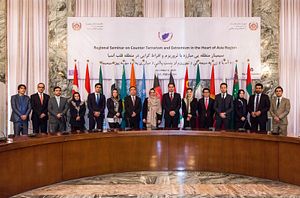The fifth iteration of the Heart of Asia-Istanbul Process ministerial conference wrapped up in Islamabad, Pakistan on Wednesday. The meeting, which seeks to bring regional countries together to support peace and stability in Afghanistan, was attended by foreign ministers or other high-level representatives from the 14 Heart of Asia member countries (including Afghanistan, China, India, Iran, Pakistan, and Russia) as well as representatives from supporting countries and organizations like the EU, Japan, and the United States.
China was represented at the conference by Foreign Minister Wang Yi. After a year in which China stepped up efforts to mediate between the Taliban and the Afghan government – and encouraged its ally Pakistan to do more to support the peace talks — Wang doubled down on the need for external countries to contribute to Afghanistan’s peace and reconstruction process. He urged the international community to “earnestly honor its commitment to help Afghanistan build capacity for development and security on the basis of respecting its sovereignty, independence and territorial integrity.” He also called for all factions in Afghanistan, as well as what Xinhua called “relevant countries in the process,” to pave the way for resumed peace talks between the Afghan government and the Taliban.
That’s a noticeable shift in tone from the 2014 Heart of Asia conference, which was held in Beijing. Last year, Premier Li Keqiang, speaking at the conference, placed more emphasis on Afghanistan’s self-governance, and urged other countries not to interfere in Kabul’s external affairs.
“The international community should respect Afghanistan’s sovereignty, independence and territorial integrity, not interfere with its internal affairs and support Afghanistan’s efforts to realize security and stability,” Xinhua paraphrased Li as saying. “[…]The international community should support the Afghan-led Afghan-owned peace process.”
This year, Wang has taken a more vocal stance on the need for external countries to support the peace process. Xinhua cited Wang as saying that “China was ready to facilitate and help build a platform for the revival of Afghanistan’s reconciliation process along with other countries.”
Those “other countries” were not specified in Wang’s remarks, but we got a clear sign of which countries China hopes to work with, thanks to Wang’s meetings on the sidelines of the conference. First, Wang held separate meetings with Afghan President Ashraf Ghani and Pakistani Prime Minister Nawaz Sharif, and expressed his support for the resumption of peace talks. Pakistan is seen as a key partner in the talks, given its relationship with the Taliban, and China has been trying to cajole its “iron brother” into a good faith effort to support Afghan reconciliation. Earlier this year, after the first successful round of Afghan-Taliban talks, there was some cautious optimism that China’s strategy was bearing fruit.
But the fragile rapprochement between Afghanistan and Pakistan didn’t last. Terrorist attacks in Kabul, including a July 2015 attack on the Afghan Parliament, led Ghani to adopt a harder stance on Pakistan, which he accused of not doing enough to root out Taliban militants within its border. “We don’t want Pakistan to bring the Taliban to peace talks, but to stop the Taliban’s activities on their soil,” Ghani said.
Internal strife among the Taliban after Mullah Omar was confirmed to have been killed two years ago also helped scuttle the peace talks.
On Wednesday, China, Afghanistan, and Pakistan held a three-party meeting where Wang was explicit about China’s hope that the peace talks can resume. The three countries also held a joint meeting with the United States. According to Xinhua, Wang had a to-do list for all four countries:
China wishes the Afghan government could stay in the course of holding peace talks with the Taliban, and China is ready to continue to facilitate and help build a platform for the revival of the reconciliation process.
China believes Pakistan can play its unique role in promoting such talks, and the United States, another important player, can also play an active and constructive role in this regard on the basis of respecting the sovereignty of Afghanistan and the will of various factions in the war-torn country.
For China, which is struggling to formulate a response to the growing threat global terrorism poses to Beijing’s interests abroad, keeping Afghanistan stable is a top priority. As Ghani noted in remarks at the conference, “terrorists from China, Russia, Uzbekistan, Tajikistan, the Middle East are all, unfortunately, present” in Afghanistan. It’s the “terrorists from China” that are most concerning to Beijing, which fears those militants will seek to carry out attacks on Chinese soil. Instability in Afghanistan, resulting in increased space for terrorist groups to operate on China’s western border, would be a nightmare for Beijing.
Yet China’s solution seems to be investing more in a process that many analysts have already written off: getting Pakistan, Afghanistan, and the Taliban to all work together to create a lasting peace. Ghani himself acknowledge at the conference that there has been “considerable uncertainty whether Pakistan would truly acknowledge a sovereign Afghan state with its legitimate government and constitution.”
However, the Afghan president expressed hope based on what he heard during the meetings this week. He told his Pakistani counterpart, “Your words today have gone a very long way to assure us in this regard and that opens up the possibility for sustained dialogue among us.”
That’s music to Beijing’s ears, and a sign that Wang’s meetings paid off. The question now is whether this round of rapprochement will last longer than the first – or whether the next terrorist attack in Afghanistan will count the peace talks as one of its casualties.

































